Food for thoughts
July 1, 2024
Thesaurus : Doctrine
► Référence complète : M. Tirel, "Publication de la directive CS3D : consécration du devoir de vigilance européen", Dr. sociétés, n°7, juillet 2024, comm. 101, pp. 37-40
____
► Résumé (fait par l'auteure) : "Objet. – Après son adoption définitive par le Parlement européen et le Conseil le 24 mai dernier (avec 17 votes pour et 10 abstentions), la directive sur le devoir de vigilance (Corporate sustainability due diligence directive, dite CS3D), a été publiée au JOUE le13 juin 2024.
Portée. – Tel que l'ambitionnait la Commission européenne, ce texte s'inspire de la loi française du 27 mars 2017 tout en remédiant à certaines de ses lacunes, bien que les ambitions premières que le texte portait ont été nettement revues à la baisse.".
____
🦉Cet article est accessible en texte intégral pour les personnes inscrites aux enseignements de la Professeure Marie-Anne Frison-Roche
________
June 28, 2024
Thesaurus : Doctrine
► Référence complète : E. Netter, "Quand la force de conviction du scoring bancaire provoque sa chute. L'interprétation extensive, par la CJUE, de la prohibition des décisions entièrement automatisées", RTD com., 2024, chron., pp.342-348
____
🦉Cet article est accessible en texte intégral pour les personnes inscrites aux enseignements de la Professeure Marie-Anne Frison-Roche
________
June 28, 2024
Thesaurus : Soft Law

► Référence complète : Autorité de la concurrence (ADLC), avis 24-A-05 du 28 juin 2024 relatif au fonctionnement concurrentiel du secteur de l’intelligence artificielle générative, juin 2024, 104 p.
____
____
📰lire le communiqué de presse accompagnant la publication de l'avis
________
June 24, 2024
Conferences
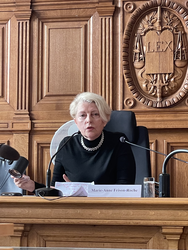
► Full Reference: M.-A. Frison-Roche, "Les deux rencontres entre l'intelligence artificielle et le Contentieux Systémique" ("The two meetings between Artificial Intelligence and Systemic Litigation"), in L’intelligence artificielle, nouveau champ de Contentieux Systémique (Artificial intelligence, new field of Systemic Litigation), in cycle of conferences-debates "Contentieux Systémique Émergent" ("Emerging Systemic Litigation"), organised on the initiative of the Cour d'appel de Paris (Paris Cour of Appeal), with the Cour de cassation (French Court of cassation), the Cour d'appel de Versailles (Versailles Court of Appeal), the École nationale de la magistrature - ENM (French National School for the Judiciary) and the École de formation des barreaux du ressort de la Cour d'appel de Paris - EFB (Paris Bar School), under the scientific direction of Marie-Anne Frison-Roche, June 24, 2024, 11am-12.30pm, Cour d'appel de Paris, Cassin courtroom.
____
🧮see the full programme of this event
____
► English Summary of the conference: In the general presentation on the theme itself, I underlined "The two meetings between Artificial Intelligence and Systemic Litigation".
The focus of this conference is not the state of what is usually called Artificial Intelligence, but rather how to correlate AI and "Emerging Systemic Litigation" (ESL).
This involves recalling what "Systemic Litigation" is (1), then looking at the contribution of Artificial Intelligence to dealing with this type of litigation (2), before considering that the algorithmic system itself can be a subject of Systemic Litigation (3).
1. What is the Systemic Litigation that we see Emerging?
On the very notion of "Emerging Systemic Litigation" (ESL), proposed in 2021, read : M.-A. Frison-Roche, 🚧The Hypothesis of the category of Systemic Cases brought before the Judge, 2021
Emerging Systemic Litigation concerns situations that are brought before the Judge and in which a System is involved. This may involve the banking system, the financial system, the energy system, the digital system, the climate system or the algorithmic system.
In this type of litigation, the interests and future of the system itself are at stake, "in the case". The judge must therefore "take them into consideration"📎
In this respect, "Emerging Systemic Litigation" must be distinguished from "Mass Litigation". "Mass litigation" refers to a large number of similar disputes. The fact that they are often of "low importance" is not necessarily decisive, as these disputes are important for the people involved and the use of A.I. must not overpower the specificity of each one. The fact remains, however, that the criterion for Systemic Litigation is the presence of a system. It may happen that a mass litigation calls into question the very interest of a system (for example, value date litigation), but more often than not the Systemic Litigation we see emerging is, unlike mass litigation, a very specific case in which one party, for example, formulates a very specific claim (e.g., asking for considerable work to be stopped) against a multinational company, and will thus "call into question" an entire value chain and the obligations incumbent on the powerful company to safeguard the climate system, which is therefore present in the proceedings (which does not, however, entitle it to make claims, but which must be taken into consideration).
2. The contribution of Algorithmic Power in the conduct of a Systemic Litigation
In this respect, AI can be a useful, if not indispensable, tool for mastering such Systemic Litigation, the emergence of which corresponds to a novelty, and the knowledge of which is brought before the Ordinary Law Judge.
Indeed, this type of litigation is particularly complex and time-consuming, with evidentiary issues at the heart of the case, and with expert appraisal following on from expert appraisal. Expert appraisals are difficult to carry out. AI can therefore be a means for the judge to control the expert dimension of Systemic Litigation, in order to curb the increased risk of experts capturing the judge's decision-making power.
The choice of AI techniques presents the same difficulties as those that have always applied to experts. It is likely that certification mechanisms, analogous to registration on expert lists, will be put in place, if we move away from construction by the courts themselves (or by the government, which may pose a problem for the independence of the judiciary), or if we want control over tools provided by the parties themselves, with regard to the principle of equality of arms due to the cost of these tools.
3. When it is the Algorithmic System itself that is the subject of a Systemic Litigation: its place is then rather in defense
Moreover, the algorithmic system itself gives rise to Systemic Litigation, in that individuals may bring a case before the courts claiming to have suffered damage as a result of the algorithmic system's operation, or seeking enforcement of a contract drawn up by the system. It is in the realm of the Ordinary Contract and Tort Law that the system may find itself involved in the jurisdictional proceedings.
It is noteworthy that, compared with the hypotheses hitherto favored in previous conference-debates, notably those of April 26, 2024 on Emerging Systemic Litigation linked to the Duty of Vigilance📎
However, the instance changes if the system is no longer presented as the potential "victim" but rather as the potential "culprit". In particular, it is much less clear what type of intervener in the proceedings, who is not necessarily a party to the dispute, should speak to explain the system's interest, particularly with regard to the sustainability and future of the AI system.
This is an area for further consideration by heads of courts.
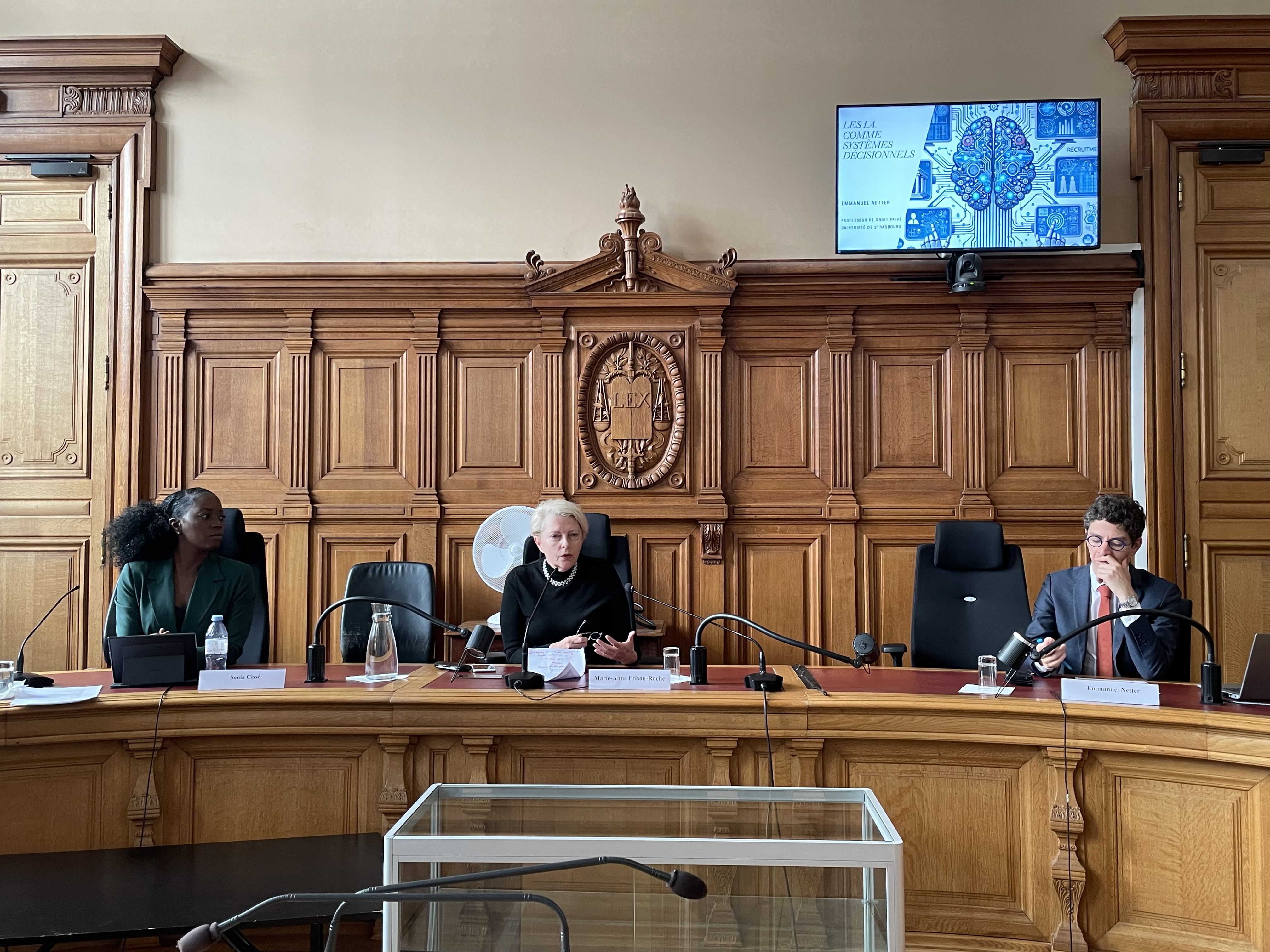
________
🕴️Fr. Ancel, 📝Compliance Law, a new guiding principle for the Trial?, in 🕴️M.-A. Frison-Roche (ed.), 📘Compliance Jurisdictionalisation, 2024.
🧮La vigilance, nouveau champ de contentieux systémique (Vigilance, new field of Systemic Litigation), in cycle of conference-debates "Contentieux Systémique Émergent" ("Emerging Systemic Litigation"), organised on the initiative of the Cour d'appel de Paris (Paris Cour of Appeal), with the Cour de cassation (French Court of cassation), the Cour d'appel de Versailles (Versailles Court of Appeal), the École nationale de la magistrature - ENM (French National School for the Judiciary) and the École de formation des barreaux du ressort de la Cour d'appel de Paris - EFB (Paris Bar School), under the scientific direction of Marie-Anne Frison-Roche, June 24, 2024.

June 24, 2024
Organization of scientific events
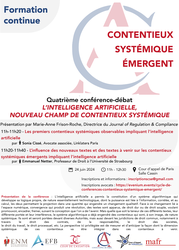
► Full Reference: L’intelligence artificielle, nouveau champ de Contentieux Systémique (Artificial intelligence, new field of Systemic Litigation), in cycle of conferences-debates "Contentieux Systémique Émergent" ("Emerging Systemic Litigation"), organised on the initiative of the Cour d'appel de Paris (Paris Cour of Appeal), with the Cour de cassation (French Court of cassation), the Cour d'appel de Versailles (Versailles Court of Appeal), the École nationale de la magistrature - ENM (French National School for the Judiciary) and the École de formation des barreaux du ressort de la Cour d'appel de Paris - EFB (Paris Bar School), under the scientific direction of Marie-Anne Frison-Roche, June 24, 2024, 11am-12.30pm, Cour d'appel de Paris, Cassin courtroom.
____
🌐see on LinkedIn the report made of this event
____
► Presentation of this conference-debate: Artificial intelligence has enabled the creation of an algorithmic system. This develops its own logic, which is essentially technological in nature. It generates computing power based on the correlation of information to produce possible causalities and build probabilities that are sometimes likened to "predictions", with the mass processed eventually generating a qualitative change.
This change is linked to the digital space itself, which by its very nature gives rise to systemic disputes and litigation, to which the conference-debate on 27 May 2024 was devoted.
There are three ways in which this Emerging Systemic Litigation is involved, and it is important to anticipate these, as the litigation is either in its infancy or still to come, but will undoubtedly arise suddenly.
Firstly, it is possible that the technological tool will make it possible to deal with certain cases where the technical nature of either the concepts or the requests, or the multitude of requests, however simple, require this ability to deal with the mass, which leads to an increase in both the mechanical power of algorithms and the greater presence of human beings, in particular through the increase in adversarial proceedings, pre-trial proceedings, mediation, etc.
Secondly, in the face of this change linked to the digital environment, 'texts' have appeared to 'regulate' the use or the very invention of this or that algorithmic tool, texts of a very diverse nature, from the most soft to the hardest (this gradation between soft and hard law is the theme taken up in the conference-debate of 19 September 2024). These may be measures taken by the firms that produce the tools, those that use them, or those that disseminate them, with the people affected by the information being relatively active. This last point explains why systemic disputes are already underway, concerning the subjective rights that would be violated either by the very nature of artificial intelligence, in this case the rights of content producers, or the rights to privacy, or protection of other Monumental Goals. The systemic and extra-territorial dimension of these disputes has already been established.
The third point is the role of Politics, since the European Union, through the texts currently being adopted, has established that the Goal is not only the sustainability of the technical system, the innovation market and European sovereignty, but also the primacy of people and individuals, through a method that is the Ex Ante ranking of risks. This conception is also contested. This methodological issue also applies to judges.
This Emerging Systemic Litigation is and will be brought before various regulatory or supervisory Authorities, but also before the administrative and judiciary courts, in particular through Contract Law, Tort Law, Company Law, Labour Law, General Procedural Law, etc.
The aim here is to measure and anticipate the way in which the systemic dimension of these disputes will be incorporated into future litigation.
____
🧮Program of this manifestation:
Fourth conference-debate
L’INTELLIGENCE ARTIFICIELLE, NOUVEAU CHAMP DE CONTENTIEUX SYSTÉMIQUE
(ARTIFICIAL INTELLIGENCE, NEW FIELD OF SYSTEMIC LITIGATION)
Paris Court of Appeal, Cassin courtroom
Presentation and moderation by 🕴️Marie-Anne Frison-Roche, Professor of Regulatory & Compliance Law, Director of the Journal of Regulation & Compliance (JoRC)
🕰️11am.-11.10am. 🎤Les deux rencontres entre l'intelligence artificielle et le Contentieux Systémique (The two meetings between Artificial Intelligence and Systemic Litigation), by 🕴️Marie-Anne Frison-Roche, Professor of Regulatory & Compliance Law, Director of the Journal of Regulation & Compliance (JoRC)
🕰️11.10am-11.30am. 🎤Les premiers contentieux systémiques observables impliquant l’intelligence artificielle (The first observable Systemic Litigations involving artificial intelligence), by 🕴️Sonia Cissé, Partner, Linklaters Paris
🕰️11.30am-11.50am. 🎤L’influence des nouveaux textes et des textes à venir sur les contentieux systémiques émergents impliquant l’intelligence artificielle (The influence of new and forthcoming legislation on Emerging Systemic Litigation involving artificial intelligence), by 🕴️Emmanuel Netter, Professor of Law at Strasbourg University
🕰️11.50am-12.30pm. Debate
____
🔴Registrations and information requests can be sent to: inscriptionscse@gmail.com
🔴For the attorneys, registrations have to be sent to the following address: https://evenium.events/cycle-de-conferences-contentieux-systemique-emergent/
⚠️The conference-debates are held in person only, in the Cour d’appel de Paris (Paris Court of Appeal).
____
🧮Read below the report made of this event by Marie-Anne Frison-Roche⤵️
June 20, 2024
Thesaurus : Doctrine
► Référence complète : V.-O. Dervieux, "Israël à Eurosatory : la justice éparpillée « façon puzzle » ?", Actu-Juridique.fr, 20 juin 2024.
____
June 19, 2024
Thesaurus : Soft Law
► Référence complète : Commission d'enquête du Sénat, Les moyens mobilisés et mobilisables par l’État pour assurer la prise en compte et le respect par le groupe TotalEnergies des obligations climatiques et des orientations de la politique étrangère de la France, juin 2024, 350 p.
____
📓lire les comptes rendus des auditions
____
________
June 19, 2024
Thesaurus : 02. Cour de cassation
June 18, 2024
Thesaurus : 08. Juridictions du fond
► Référence complète : Cour d'appel de Paris, Pôle 5, Chambre 12, 18 juin 2024, n° RG 23/10583, Suez
____
____
🏛️consulter une présentation de l'arrêt rendu le même jour dans l'affaire dite TotalEnergies
____
🏛️consulter une présentation de l'arrêt rendu le même jour dans l'affaire dite EDF
____
📰lire le communiqué de presse accompagnant le prononcé de ces trois arrêts
____
📝Commentaires de cette décision :
- Rev. int. compliance, n°4, 30 juillet 2024, act. 135
________
June 18, 2024
Thesaurus : 08. Juridictions du fond
► Référence complète : Cour d'appel de Paris, Pôle 5, Chambre 12, 18 juin 2024, n° RG 21/22319, EDF
____
____
🏛️consulter une présentation de l'arrêt rendu le même jour dans l'affaire dite TotalEnergies
____
🏛️consulter une présentation de l'arrêt rendu le même jour dans l'affaire dite Suez
____
📰lire le communiqué de presse accompagnant le prononcé de ces trois arrêts
____
📝Commentaires de cette décision :
- Rev. int. compliance, n°4, 30 juillet 2024, act. 135
________
June 18, 2024
Thesaurus : 08. Juridictions du fond
► Référence complète : Cour d'appel de Paris, Pôle 5, Chambre 12, 18 juin 2024, n° RG 23/14348, TotalEnergies
____
____
🏛️consulter une présentation de l'arrêt rendu le même jour dans l'affaire dite Suez
____
🏛️consulter une présentation de l'arrêt rendu le même jour dans l'affaire dite EDF
____
📰lire le communiqué de presse accompagnant le prononcé de ces trois arrêts
____
📝Commentaires de cette décision :
- Rev. int. compliance, n°4, 30 juillet 2024, act. 135
________
June 13, 2024
Thesaurus : 06.1. Textes de l'Union Européenne
► Full Reference: Directive (EU) 2024/1760 of the European Parliament and of the Council of 13 June 2024 on corporate sustainability due diligence and amending Directive (EU) 2019/1937 and Regulation (EU) 2023/2859 (CS3D)
____
► read the text of the directive
____
📧see on LinkedIn the article published by Marie-Anne Frison-Roche in the Newsletter MAFR. Regulation, Compliance, Law, on the occasion of the publication of this directive in the Official Journal of the European Union
________
June 13, 2024
Thesaurus : 02. Lois
► Référence complète : Loi n°2024-537 du 13 juin 2024 visant à accroître le financement des entreprises et l’attractivité de la France, J.O. 14 juin 2024
____
📝lire la loi
____
Son article 25 dispose : "La section 5 du chapitre I er du titre I er article L. 311-16-1 ainsi rédigé : du livre III du code de l’organisation judiciaire est complétée par un « Art. L. 311-16-1. – La cour d’appel de Paris, qui comprend une chambre commerciale internationale, connaît : « 1 o Des recours en annulation des sentences rendues en matière d’arbitrage international, dans les cas et les conditions prévus par le code de procédure civile ; « 2 o Des recours contre une décision qui statue sur une demande de reconnaissance ou d’exequatur d’une sentence rendue en matière d’arbitrage international, dans les cas et les conditions prévus par le même code. »
____
June 13, 2024
Thesaurus : 06.1. Textes de l'Union Européenne
► Full Reference: Regulation (EU) 2024/1689 of the European Parliament and of the Council of 13 June 2024 laying down harmonised rules on artificial intelligence and amending Regulations (EC) No 300/2008, (EU) No 167/2013, (EU) No 168/2013, (EU) 2018/858, (EU) 2018/1139 and (EU) 2019/2144 and Directives 2014/90/EU, (EU) 2016/797 and (EU) 2020/1828 (Artificial Intelligence Act - "IA Act")
____
________
June 13, 2024
Editorial responsibilities : Direction of the collection "Regulations & Compliance", JoRC & Dalloz
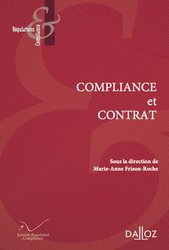
► Référence complète : M.-A. Frison-Roche (dir.), Compliance et Contrat, coll. "Régulations & Compliance", Journal of Regulation & Compliance (JoRC) et Dalloz, à paraître.
____
📘Parallèlement, un ouvrage en anglais, Compliance & Contract, est publié dans la collection éditée par le Journal of Regulation & Compliance (JoRC) et les Éditions Bruylant.
____
🧮Cet ouvrage vient à la suite d'un cycle de colloques 2023 organisés par le Journal of Regulation & Compliance (JoRC) et des Universités qui lui sont partenaires.
____
📚Ce volume s'insère dans la lignée des ouvrages qui dans cette collection sont consacrés à la Compliance.
► Lire les présentations des autres ouvrages de la Collection portant sur la Compliance :
- les ouvrages suivants :
🕴️M.A. Frison-Roche (dir.), 📕Le système probatoire de la Compliance, 2025
- les ouvrages précédents :
🕴️M.A. Frison-Roche (dir.), 📕L'obligation de Compliance, 2024
🕴️M.A. Frison-Roche et M. Boissavy (dir.), 📕Compliance & droits de la défense. Enquête interne - CJIP - CRPC, 2024
🕴️M.A. Frison-Roche (dir.), 📕La juridictionnalisation de compliance, 2023
🕴️M.A. Frison-Roche (dir.), 📕Les buts monumentaux de la Compliance, 2022
🕴️M.A. Frison-Roche (dir.), 📕Les outils de la Compliance, 2021
🕴️M.A. Frison-Roche (dir.), 📕Pour une Europe de la Compliance, 2019
🕴️N. Borga, 🕴️J.-Cl. Marin et 🕴️J-.Ch. Roda (dir.), 📕Compliance : Entreprise, Régulateur, Juge, 2018
🕴️M.A. Frison-Roche (dir.), 📕Régulation, Supervision, Compliance, 2017
🕴️M.A. Frison-Roche (dir.), 📕Internet, espace d'interrégulation, 2016
📚Consulter tous les autres titres de la collection.
___
► Présentation générale de l'ouvrage : L'ouvrage précédemment publié dans la collection "Régulations & Compliance" porte sur L'obligation de Compliance. Le contrat y est évoqué, non seulement parce qu'en soi le contrat est source d'obligations, mais encore parce qu'en pratique les entreprises ont rapidement contractualisé leur obligation légale de compliance.
____
🏗️Construction générale de l'ouvrage :
________
June 13, 2024
Interviews

► Full reference: M.-A. Frison-Roche, "Entreprises et compliance : une justice et des juges plus offensifs" ("Companies and compliance: more aggressive courts and judges"), interview conducted by Jean-Philippe Denis as part of a series of interviews on Compliance Law, in Fenêtres ouvertes sur la gestion (Open windows on management), broadcast by J.-Ph. Denis, Xerfi Canal, recorded December 12, 2023, released on June 14, 2024.
____
🌐consult the December 2023 presentation of the interview on LinkedIn
____
🎥watch the interview video on LinkedIn, with English subtitles
____
🧱consult the general presentation of this series of interviews on Compliance Law
____
► Starting point: Since 2016, Marie-Anne Frison-Roche has been building Compliance Law, notably through a collection co-published in French with Editions Dalloz and co-published in English with Editions Bruylant:
🧱read the presentation in English of the series in French, Régulations & Compliance ➡️click HERE
🧱read the presentation of the series in English, Compliance & Regulation ➡️click HERE
____
► Summary of interview:
Jean-Philippe Denis. Question :
Marie-Anne Frison-Roche. Answer. :
____
J.-Ph D. Q. : Thus
MaFR. A. : Yes,
____
J.-Ph. D. Q. : Thus
MaFR. A. : Yes,
________
June 12, 2024
Conferences

🌐follow Marie-Anne Frison-Roche on LinkedIn
🌐subscribe to the Newsletter MAFR Regulation, Compliance, Law
____
► Full Reference: M.-A. Frison-Roche, Participation in the panel "Une Gouvernance responsable : vers un mieux vivre ensemble ?" ("Responsible governance: towards a better way of living together"), in Grenelle du Droit 5. L'avenir de la filière juridique, Association française des juristes d'entreprise ("The future of the legal profession"), AFJE), Cercle Montesquieu and Paris Panthéon-Sorbonne University, Campus Port-Royal Université Paris 1 Panthéon-Sorbonne, 1 rue de la Glacière, 75013 Paris, June 12, 2024
____
🧮See the full programme of this event (in French)
____
🎥watch the interview made just after this round-table discussion (in French)
____
🪑🪑🪑🪑🪑 will also be taking part in this round-table discussion:
🕴️Yves Garagnon, Chairman of Dilitrust,
🕴️Pierrick Le Goff, lawyer, partner at De Gaulle Fleurance,
🕴️Sabine Lochmann, Chairman of Ascend,
🕴️Vincent Vigneau, President of the Commercial, Economic and Financial Chamber of the Cour de cassation (French Judicial Supreme Court)
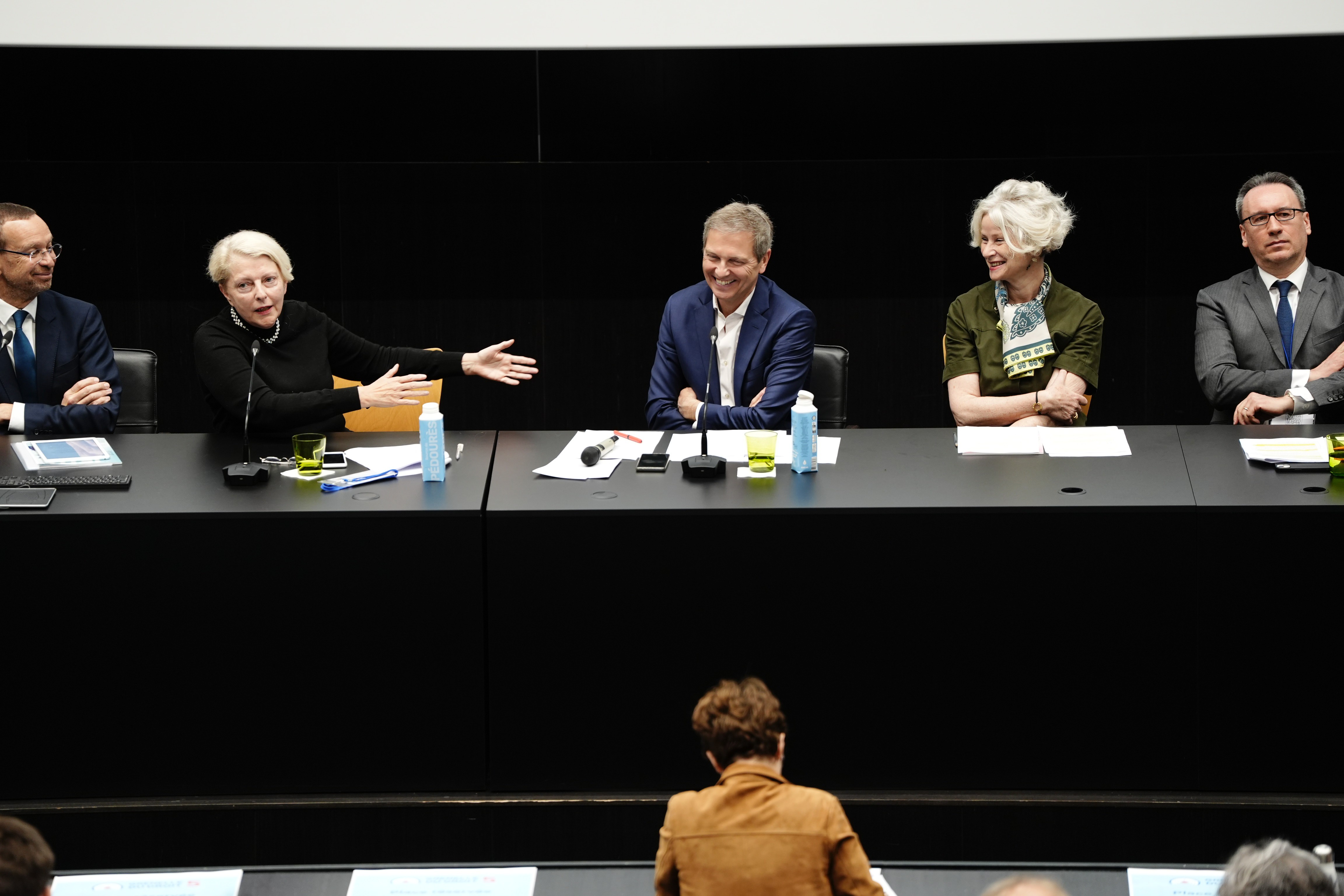
____
► English presentation of my intervention in this event's opening plenary round-table: In this plenary round table which opens the event, devoted to the theme of 'responsible corporate governance', for my interventions based on my work I will have the opportunity to address more particularly these different perspectives:
- How the new Compliance Law, which gives concrete expression to the responsibility of enterprises in a new relationship with States and with civil society, constitutes a 'legal revolution
- 💡for the record, mafr,📝Compliance Law, 2016 ; (ed.) 📘Compliance Monumental Goals, 2022
- how the judgment handed down by the Tribunal judiciaire de Paris (Paris First Instance Civil Court) on 28 February 2023 (Total Ouganda case) is remarkable and already constitutes a turning point in case law
- 💡for the record, mafr, 🎤audition as amica curiae, hearing of 26 October 2022 before the first instance Paris Court; (ed)📘Compliance Jurisdictionalisation, 2024
- how the relationship between States and enterprises is being renewed by this profound legal movement expressed by Compliance Law
- 💡for the record, mafr et M. Boissavy (ed.), 📕Compliance et droits de la défense - Enquêtes internes, CJIP, CRPC, mafr (dir.), 📘 Compliance Obligation, 2025
- how internal lawyers have a decisive and central role to play in this movement, particularly in the mechanism of vigilance / corporate sustainability due diligence, the "cutting edge" of Compliance Law,
- 💡for the record, mafr, 📝Contract of Compliance, Compliance stipulations, 2023 ; (ed.), 📘Compliance and Contract, 2025
- what is meant by the "Ex Ante responsibility" of enterprises, which does not necessarily entail their Ex Post liability, a distinction which lawyers are the guardians of
- 💡for the record, mafr, 📝La responsabilité Ex Ante, pilier du Droit de la Compliance ("Ex-Ante Responsability, Compliance Law Pillar"), 2021
- how European Compliance Law is profoundly humanist, an identity that distinguishes European Compliance from American Compliance and, above all, from Chinese Compliance.
- 💡for the record, mafr (ed.), 📕Pour une Europe de la Compliance ("For the Europe of the Compliance"), 2017
________
read the article about this round table written by Delphine Bauer in Actu-Juridique (in French)
June 6, 2024
Editorial responsibilities : Direction of the collection "Cours-Série Droit privé", Editions Dalloz (33)
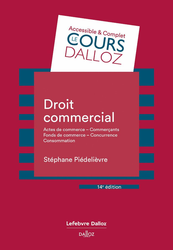
► Référence complète : S. Piédelièvre, Droit commercial (Actes de commerce - Commerçants - Fonds de commerce - Concurrence - Consommation), Dalloz, coll. "Cours Dalloz-Série Droit privé", 1ière éd., 1997, 14ième éd., 2024, 480 p.
____
► Présentation générale de l'ouvrage : Cet ouvrage, qui s’adresse principalement aux étudiants de L2 et L3, propose une approche claire et détaillée de la notion de commercialité. Il intéressera également les praticiens souhaitant actualiser leurs connaissances en droit commercial.
Complexe dans le système français, cette notion suscite de nombreuses questions appelant des solutions concrètes d’une grande importance comme les régimes de compétence et de preuve. Cet ouvrage aborde la question du droit commercial à travers les actes de commerce, les commerçants, les fonds de commerce, ainsi que la concurrence et la consommation.
L’auteur s’est appliqué à présenter les règles qui constituent les principes de l’activité marchande.
____
📕lire la quatrième de couverture
____
____
📚consulter l'ensemble de la collection dans lequel l'ouvrage a été publié
________
June 3, 2024
Thesaurus : Convention, contract, settlement, engagement
► Référence complète : N. Yax, H. Anlio & S. Palminteri, "Studying and improving reasoning in humans and machines", Communications Psychology volume 2, Article number: 51 (2024)
____
May 31, 2024
Thesaurus : 06.1. Textes de l'Union Européenne
► Full Reference: Regulation (EU) 2024/1620 of the European Parliament and of the Council of 31 May 2024 establishing the Authority for Anti-Money Laundering and Countering the Financing of Terrorism and amending Regulations (EU) No 1093/2010, (EU) No 1094/2010 and (EU) No 1095/2010
____
________
May 31, 2024
Thesaurus : 06.1. Textes de l'Union Européenne
► Référence complète : Directive (EU) 2024/1640 of the European Parliament and of the Council of 31 May 2024 on the mechanisms to be put in place by Member States for the prevention of the use of the financial system for the purposes of money laundering or terrorist financing, amending Directive(EU) 2019/1937, and amending and repealing Directive (EU) 2015/849
____
________
May 31, 2024
Thesaurus : 06.1. Textes de l'Union Européenne
► Full Reference: Regulation (EU) 2024/1624 of the European Parliament and of the Council of 31 May 2024 on the prevention of the use of the financial system for the purposes of money laundering or terrorist financing
____
________
May 30, 2024
Thesaurus : Doctrine
► Référence complète : Th. Douville, "De l'approche extensive de la prise de décision exclusivement automatisée (à propos du refus d'un prêt fondé sur une note de solvabilité communiquée par un tiers)", D. 2024, pp. 1000-1004
____
🦉Cet article est accessible en texte intégral pour les personnes inscrites aux enseignements de la Professeure Marie-Anne Frison-Roche
________
May 27, 2024
Conferences
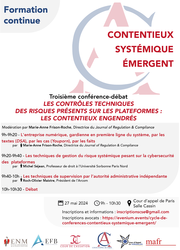
🌐follow Marie-Anne Frison-Roche on LinkedIn
🌐subscribe to the Newsletter MAFR Regulation, Compliance, Law
____
► Full Reference: M.-A. Frison-Roche, "Le Contentieux Systémique Emergent du fait du système numérique ("emerging systemic litigation arising from the digital system"), in Les contrôles techniques des risques présents sur les plateformes et les contentieux engendrés (Technical controls on the risks present on platforms and the disputes that arise), in cycle of conferences-debates "Contentieux Systémique Émergent" ("Emerging Systemic Litigation"), organised on the initiative of the Cour d'appel de Paris (Paris Cour of Appeal), with the Cour de cassation (French Court of cassation), the Cour d'appel de Versailles (Versailles Court of Appeal), the École nationale de la magistrature - ENM (French National School for the Judiciary) and the École de formation des barreaux du ressort de la Cour d'appel de Paris - EFB (Paris Bar School), under the scientific direction of Marie-Anne Frison-Roche, May 27,2024, 9h-10h30, Cour d'appel de Paris, Cassin room
____
🧮see the full programme of this event
____
____
🔲see the slides (in French), basis of this conference
____
🌐read on LinkedIn the summary of this conference les slides
____
🎤read the presentation of the second conference in this manifestation: "Un contentieux systémique in vivo : le cas dit des sites pornographiques" ("a Systemic Litigation in vivo: the case of pornographic prestations platforms")
____
____
____
► Summary of this conference: This speech is a prelude to the three more specific speeches and aims to show how the digital system, by its very nature, produces and will produce "Systemic Litigation".
Systemic Litigation" is defined by "cases" (a procedural notion) brought before judges, who may be judges of first instance, or possibly emergency judges, in which the interests, or even the future, of a system are involved beyond the dispute between the parties.
This Systemic Case may be brought before a specialised judge, including the juridictional body of a Regulatory or Supervisory Authority, but also before a judge of ordinary Law, on the basis of a special text but possibly on the basis of a text of ordinary Law. This can lead to a fragmentation of litigation, even though the unity of the system remains, or even is at stake, in the present and in the future.
The "digital system" is an example of the "natural" production of Systemic Litigation which arise as a result of the Digital System alone, in particular because of the systemic risks inherent in this system, and the fact that their prevention and management are internalised in the operators who have built and manage the system (Compliance Law). The issue is therefore one of Interregulation.
Platforms in particular give rise to Systemic Litigation because of the specific nature of certain risks, for example disinformation, terrorism, destruction of rights (copyright being just one example), the risk of minors having access to content that is destructive for them, and so on.
Digital Systemic Litigation has only just begun.
It is essential that judges are prepared for this and that they face up to it together through dialogue.
________
May 27, 2024
Conferences

🌐suivre Marie-Anne Frison-Roche sur LinkedIn
🌐s'abonner à la Newsletter MAFR Regulation, Compliance, Law
____
► Référence complète : M.-A. Frison-Roche, "Un contentieux systémique in vivo : le cas dit des sites pornographiques", in Les contrôles techniques des risques présents sur les plateformes et les contentieux engendrés, in cycle de conférences-débats "Contentieux Systémique Émergent", organisé à l'initiative de la Cour d'appel de Paris, avec la Cour de cassation, la Cour d'appel de Versailles, l'École nationale de la magistrature (ENM) et l'École de formation des barreaux du ressort de la Cour d'appel de Paris (EFB), sous la responsabilité scientifique de Marie-Anne Frison-Roche, 27 mai 2024, 9h-10h30, Cour d'appel de Paris, salle Cassin
____
🧮consulter le programme complet de cette manifestation
____
🧮consulter le programme de l'ensemble du cycle Contentieux Systémique Émergent
____
🔲consulter les slides ayant servi de support à l'intervention
____
🌐consulter sur LinkedIn les slides ayant servi de support à l'intervention
____
🎤consulter une présentation de la seconde intervention de Marie-Anne Frison-Roche prononcée lors de cette conférence-débat : "Le contentieux Systémique Emergent du fait du système numérique"
____
____
____
► Résumé de cette conférence :
________